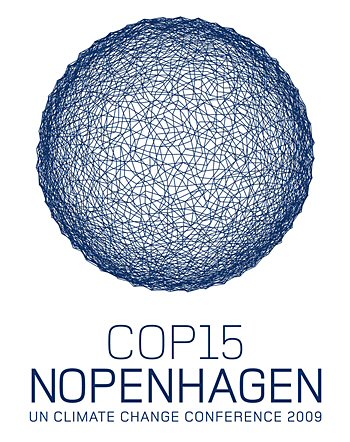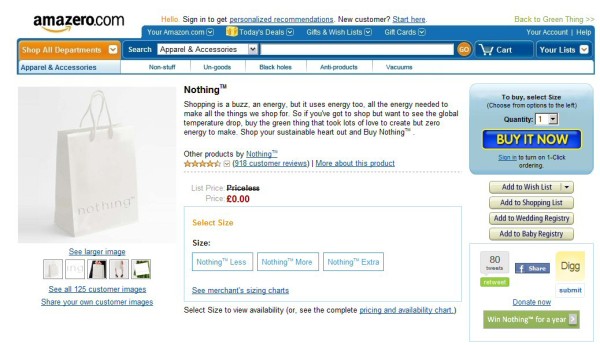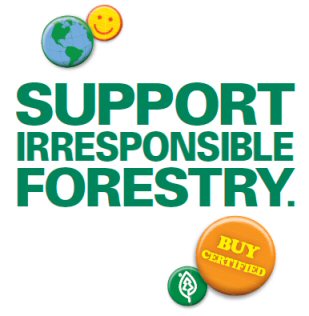Organic Doesn’t Mean Good In Peanut Butter
Posted by keith on December 11th, 2009
I really like peanut butter! There you go, no secret about it, and in terms of ecological footprint it’s a lot better than beef, pork or cheese, even when the peanuts have to come from thousands of miles away. However, and this is the point of this Friday afternoon bit of mental cruelty, it seems that not all peanut butters are made the same.
Step forward Whole Earth Organic Crunchy Peanut Butter, my second favourite because it’s really crunchy and tastes nice and earthy. I was also influenced by the “organic” bit, because it really is organic as far as the peanuts are concerned, but as Lierre Keith has been going on about for a while, just because it’s organic doesn’t mean it’s not destructive. Nevertheless, like for like, I would rather have organic than non-organic.
Then we have my personal favourite, and probably the favourite of most British kids, Sun Pat Original Crunchy Peanut Butter – I have no idea why it tastes so nice, but it does, so there! It doesn’t have it’s own page on the Premier Foods web site, because Premier Foods own loads of different brands, as opposed to Whole Earth, whose owners are a relatively small company, so you’ll have to take my word for the ingredients – which I have in front of me, printed on the label, on the jar:
Roasted Peanuts, Stabilizer (E471), Cane Sugar, Peanut Oil, Sea Salt.
So, just 5 ingredients, including the strange sounding E471, which turns out to be a fatty acid derived from vegetable oil, used to keep the peanuts in good condition (I phoned them up). Nothing too sinister there apart from the cane sugar, which I try to avoid normally, preferring to buy British sugar beet.
Going back to the Whole Earth peanut butter; if you click on the link above you get the list of ingredients, of which there are just four (no sugar in this one). And, as I say, it’s all organic. But look at the second ingredient: it’s Palm Oil, that ubiquitous ingredient which is found in everything from potato crisps to biscuits to hair conditioner to motor fuel. To sum up: palm oil is a disaster.
It seems that Whole Earth recognise this, and have linked to a special page which tells customers all about how nice and ethical the palm oil they use is:
we are well aware of the environmental concerns surrounding palm oil and are pleased to be able to tell you that the the palm oil in our Peanut Butters is supplied by one of the founding members of the round table for sustainable palm oil (RSPO). Their plantations are managed in such a way as to maximise long-term sustainability throughout the production process. Their methods include zero-burning policies, special planting techniques and ‘natural’ production processes which minimize pollution, reduce the use of fossil fuels and artificial fertilizers, and safeguard the environment. Equally, they follow sustainable ‘social’ policies, created to enhance the local economy and the lives of those who work on or close to their plantations. Their ethical and environmental policies relate to the environment as a whole and are in line with Sustainable criteria as defined by the RSPO, which also includes specific Orang Utang habitat as a high conservation value.
Whole Earth are setting great stall by the policies of the RSPO, but as I exposed on The Unsuitablog in April 2008, the Roundtable on Sustainable Palm Oil cannot be trusted to look after habitats, and they certainly aren’t the kind of body you would want to use to rubberstamp your environmental credentials:
1) As a group of big businesses whose primary interest is to ensure the expansion of the lucrative palm oil industry – retailers, traders, processors, growers, investors; that sort of thing — set up a shell organisation that claims it is going to make the industry “sustainable”.
2) Call in some gullible (yes, I said “gullible”) NGOs and environmentalists and say that they can have a seat on this august, influential body if they allow business to continue as before — but they will be allowed to suggest changes to the industry providing it doesn’t affect the business model.
3) Repeatedly announce to the world, through member companies such as Sainsburys and Unilever, that agreements are being reached and work is moving on swiftly to make plantations sustainable, but that we have to give them time because this is a tough job, and there are so many products that contain this oil it is just “impossible” to do this any other way.
4) Do almost nothing for years while counting the massive profit that has been made from cheap oil being grown on recently deforested land using cheap labour.
5) After a few years say that the there are so many plantations that no more deforestation has to take place. Meanwhile the South East Asian rainforest has ceased to exist, carbon levels through wood and peat burning have boosted the greenhouse effect, and people have still not realised they have been well and truly greenwashed.
So, with that in mind, I called up Whole Earth, who answer the phone as “Callow Foods” and tried to find out why they thought their palm oil was sustainable. Here is the recording:
Whole Earth Foods talk about Palm Oil
Columbian palm oil, “certified” by the RSPO. Hmm, I think I’ll stick to Sun Pat for the time being…
Posted in Astroturfs, Company Policies, Corporate Hypocrisy | 5 Comments »



















